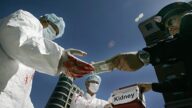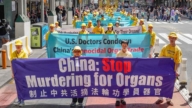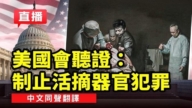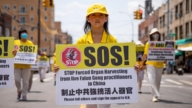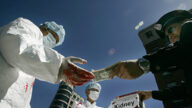【新唐人2013年02月26日讯】近年来,中共“非法活体摘除和贩卖人体器官”的消息震惊世界,对此,中共一边否认指控,一边出台了多个关于“人体器官捐献”的政策。日前,中国卫生部宣布,将在今年内建立所谓“器官捐献和分配网路”,鼓励民众积极参与捐献器官,但网民担心,新政策的出台,是针对百姓的又一种敛财手段。
2月25号,中国卫生部和红十字会召开人体器官捐献会议,决定推广人体器官捐献和器官分配工作,并有可能在年内建立一个中国器官捐献信息管理系统,将人体器官捐献志愿者信息全国联网,再通过中国器官分配系统,自动分配给最需要的患者。
但由于近年来大陆关于红十字会与地下血站勾结卖血导致爱滋病泛滥、疾控中心非法销售有毒疫苗等事件频频曝光,使民众对政府采取的一系列关于人体器官捐献的新举措,都持怀疑和观望态度,甚至有网友对此感到惊恐,担心是针对百姓的又一种敛财手段。
独立评论员邢天行﹕“同样这种捐献单位,比方说献血、捐款、红十字会大家都知道,血站的问题、后来又建立一个疾控中心,这些建立之初的时候,所谓的立法跟今天他们想对器官立法一模一样,包括说词都是怎么为老百姓好,怎么规范社会秩序、市场,但最终结果是,这些机构真正成为了跟罪犯联手作案的一个地方。”
中央一带头,地方政府纷纷响应,据官方报导,自3月1号起天津、江西也分别实施人体器官捐献的地方法规。其中《江西省遗体捐献条例》规定:生前未明示不捐献遗体的人身故后,其配偶、成年子女、父母等近亲属可以表示同意捐献其遗体。
邢天行﹕“这个是不是侵犯人权呢﹖那这个人本身不想捐献,可是他死了谁能公证他是否定要捐献的呢?如果允许这样下去,我们可以想像,在中国现在社会,道德沦落的时候,你想杀一个人把他给卖了,那太容易了,而且现在变成了合理、合法的了。”
按照官方说法,早在2010年3月,中国卫生部联合红十字会就曾在天津、广东、江西等10个省市,开展人体器官捐献试点,至今发展到19个省市,但截至今年2月21号,3年间,仅有641人自愿捐献器官,平均每年仅200多例,与官方宣称的,中国每年真正实施器官移植手术1万多台的数字相差甚远。因此,中国人体器官来源问题,一直为社会各界猜测和质疑。
时事评论员蓝述﹕“器官移植是一个非常特殊的程序,供体和受体之间能不能合适,手术必须有非常高科技要求的环境、人才、术后服务、术后护理等等,这一系列程序它是一个大规模的, 所以器官移植的大面积发生,它背后一定是一个国家行为。只有国家性的犯罪 ,才有可能聚集如此多的技术、人力、人才资源以及环境。”
中共政府声称,新出台的政策和措施,会对非法贩卖人体器官的犯罪行为起到遏制作用,对此,独立评论员邢天行持不同观点。
邢天行﹕“它这个建立者、监督者、执法者、执政者都是一家、那么它这一家的存在就是藏污纳垢,可能是成为犯罪的温床。它会迅速沦为像以前那些机构那样,一个巨大的可能是犯罪的团伙,也就是像有的人开玩笑,说反贪局成立是为了反贪,但最后反贪局成了最大贪污的、利用反贪来贪污腐败的一个机构。”
邢天行还表示,关于人体器官捐献的立法,并没有公民的参与讨论和制定,也没有真正有效的监督机制,立法中的条例,等于是单方面的对公众强制实施,这一点最令她感到担忧。
采访/陈汉 编辑/张天宇 后制/萧宇
Chinese Communist Regime Reveals Policy on Human Organ Donation
In recent years, exposure of the Chinese Communist Party
(CCP) regime engaging in illegal organ harvesting and
trafficking of human organs has shocked the world.
The CCP has denied the allegations, while introducing
several policies to manage human organ donation.
A few days ago, China’s Ministry of Health declared that
it would set up a nationwide information network
for organ donation and allocation within the year.
The system was said to encourage public organ donation.
Netizens are worried that the new policy will be used
by authorities to accumulate wealth from civilians.
On February 25, China’s Health Ministry and
Red Cross held a meeting on human organ donation.
It decided to promote human organ
donation and organ allocation in China.
Reportedly, an information management
system is expected to be set up this year.
The system is designed as a nationwide network
centralizing information about voluntary organ donation.
Through an organ allocation system, the information
is automatically assigned to patients in need.
In recent years, the regime’s Red Cross,
as well as Control Disease & Prevention
Center (CDC) have had scandals exposed.
This included the Red Cross’ being involved in
illegal blood collection stations’, and pooling
blood, which led to the AIDS epidemic in China.
The CDC was involved in the illegal sale of toxic vaccines.
Therefore, these official new initiatives
have aroused the public skepticism.
Some netizens even felt panic, fearing this is a new
way for the CCP to accumulate wealth from civilians.
Xing Tianxing, critic: “The Red Cross is notorious for
scandals involving blood donation, money donation,
and illegal practices in its blood collection facilities.
Later, the regime set up a Control
Disease & Prevention Center.
Legislation that manages these organizations is the
same that currently exists to manage organ donation.
Those official donation agencies, when being
established, were said to serve the people
and to regulate social order and the market.
But in the end, these organizations have
teamed up with criminals to commit crimes.”
The CCP central authorities’ actions
are echoed by local authorities.
In Tianjin and Jiangxi, local laws and regulations
on human organ donation will take effect from
March 1, according to the official report.
Jiangxi’s body donation provides the following guidance:
“If the deceased had not expressly agreed to donation
before his/her death, his spouse, adult children, parents or
other close relatives have the right to agree to donation.”
Xing Tianxing: “Isn’t this a violation of human rights? The
person hadn’t agreed to donate his body before their death.
After he/she died, who can notarize
his/her wiliness to donate?
Immorality is rampant today in China,
where the law makes such a practice legal.
That will greatly encourage murder for
the purpose of selling bodies and organs.”
Reportedly, in March 2010, China’s Ministry of Health
and the Red Cross jointly launched a pilot program
of human organ donation in 10 provinces and cities.
The areas included Tianjin, Guangdong and Jiangxi.
Now the experiment has covered 19 princes and cities.
By the end of February 21, 2013, only 641
people have agreed to donate their organs.
That is, an annual average of about
200 cases in the past three years.
This greatly differs from the official level the CCP claims.
“Every year, the real number of
China’s transplants is over 10,000."
With that, the public are suspicious of
the true sources for China’s transplants.
Lan Shu, critic: “Organ transplantation
is a very special procedure.
It involves the issue of compatibility
between the donor and recipient.
The surgery requires a high-tech environment,
professionals, as well as post-operative care.
Now in China, large-scale transplants have
occurred, behind which must be an official support.
Only state power can gather such demanding technology,
professionals, and the environment for a large-scale crimes.”
The CCP authorities alleged that these new policies and
measures will curb illicit trafficking of human organs.
Critic Xing Tianxing took a different view.
Xing Tianxing: “The CCP regime itself is an
integration of legislative power, oversight,
judicial power, and executive power.
It exists as a den of inequity, which
may serve as a hotbed of crime.
It can be reduced to a large criminal gang, just
like those organizations I mentioned early.
Someone joked that China’s Anti-Corruption
Administration was set up to combat corruption.
But finally, it has become the biggest corrupt agency.”
Xing Tianxing adds that China’s citizens didn’t participate
in the formulation of relevant human organ donation laws.
And neither do there exist real effective
watchdog mechanisms in China.
That means that the legislations unilaterally
require the public to obey, which is concerning.


